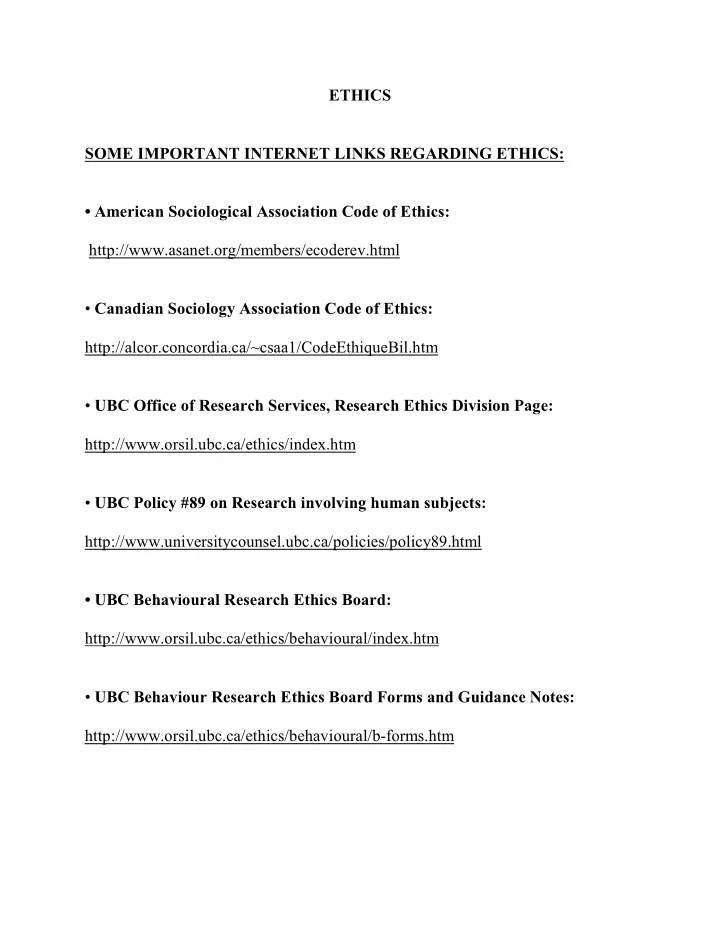

ETHICS SOME IMPORTANT INTERNET LINKS REGARDING ETHICS: • American Sociological Association Code of Ethics: http://www.asanet.org/members/ecoderev.html • Canadian Sociology Association Code of Ethics: http://alcor.concordia.ca/~csaa1/CodeEthiqueBil.htm • UBC Office of Research Services, Research Ethics Division Page: http://www.orsil.ubc.ca/ethics/index.htm • UBC Policy #89 on Research involving human subjects: http://www.universitycounsel.ubc.ca/policies/policy89.html • UBC Behavioural Research Ethics Board: http://www.orsil.ubc.ca/ethics/behavioural/index.htm • UBC Behaviour Research Ethics Board Forms and Guidance Notes: http://www.orsil.ubc.ca/ethics/behavioural/b-forms.htm
SOME BRIEF, GENERAL ETHICAL PRINCIPLES FOR SURVEY RESEARCH: Ethical Issues: Some basic ethical principles that normally have to be met in social research include: 1. That no harm come to the subjects (e.g. respondents). 2. That participants provide informed consent. 3. That participants participate in the research voluntarily. 4. That the identities of individuals are confidential, and that their responses are anonymous. In developing procedures for your proposed research project you need to think about these principles simultaneously.
• With regard to point # 1, you should not develop survey questionnaire items that might embarrass respondents or cause them substantial discomfort. In general, the costs of participation should not outweigh the benefits. (Though sometimes the latter are collective and the former are individual.)
• With regard to points #2 and #3, everyone should be aware that their participation is voluntary. In particular, the instructions on the questionnaires should indicate that people’s participation is voluntary, and that they are free to skip any questions that they feel uncomfortable answering. The instructions on the questionnaire should indicate that people provide their consent to participate by the act of completing the questionnaire. • Interview generally require a written consent form. For example, a standard way of wording a consent form is as follows: “I agree to participate in this interview concerning ..... I understand that my participation in this study is voluntary and that I may refuse to answer any questions, and may withdraw from the interview at any time. I understand that my confidentiality will be protected in the following ways: (1) information will be recorded without my name; (2) reports and documents produced from this research will not contain any identifying information about myself. I have read and understood this consent form and retained a copy for my own records.”
• With regard to point #4, a standard procedure is that the questionnaire (or interviewer) should tell people not to put their names or any other identifying information on their questionnaire. • One standard way of reassuring respondents about anonymity and confidentiality is to say something like the following in the cover letter: “The reports that are produced from this research will contain summary statistics (e.g., averages and percentages of group members’ responses to various questions), but results will be presented in a manner that will prevent the identification of individual respondents.” • There are some instances, however, when people’s identities will not be kept confidential. In such circumstances research participants should be made aware of this situation and any possible consequences, and their consent obtained.
Recommend
More recommend